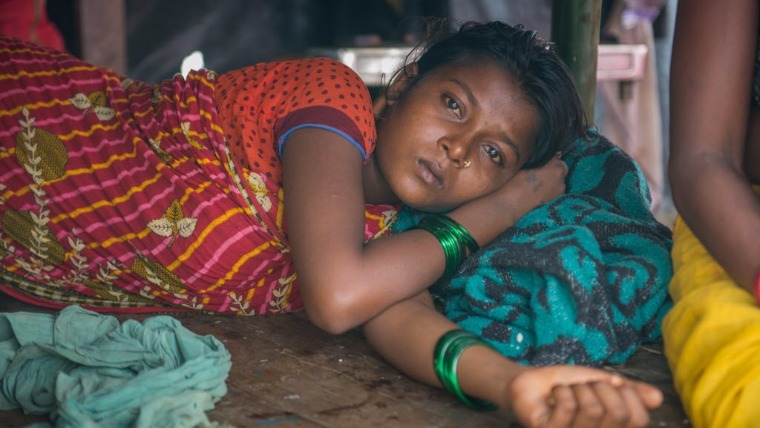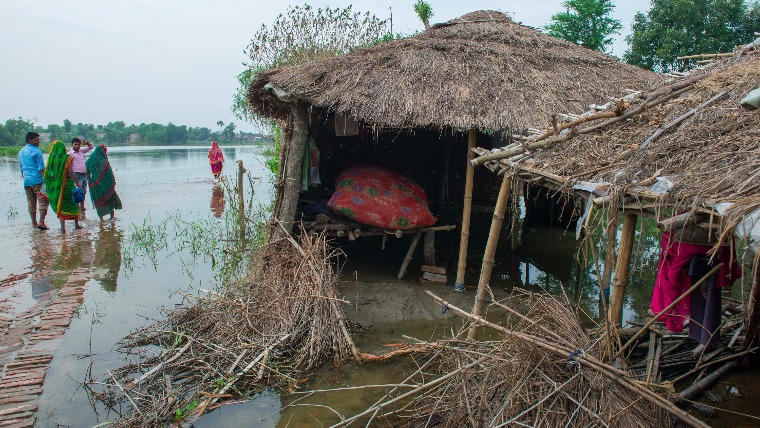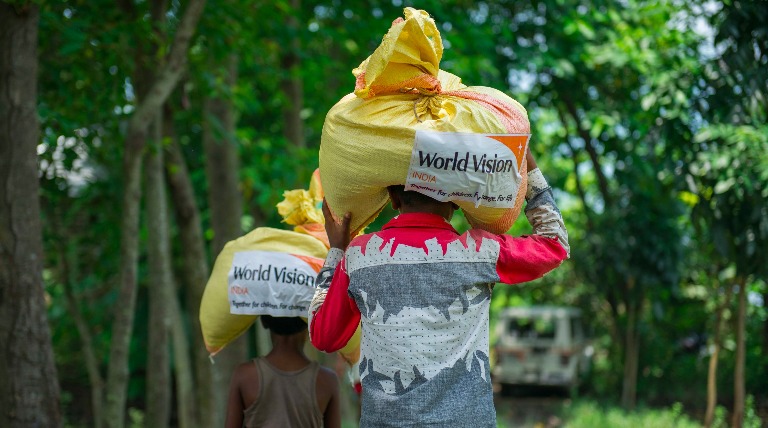Lives fractured by the floods: India’s monsoon survivors
By Jim Kasom, Media Specialist (World Vision India)

Sushilla, 21, lost her baby the day after the monsoon floods hit her village
Supporting the recent monsoon flood response was my first big humanitarian emergency relief trip with World Vision India. During the plane ride to Patna, the capital of Bihar and one of the worst flood affected areas, I felt nervous about the task ahead.
News stories of the flood damage kept flashing through my mind – children washed away, others clinging to flimsy trees; more than 200 lives lost. Mentally I was already in the flood area.
Night passed and a new day dawned in Patna where a meeting was set-up with our Emergency team. With our bags packed we left for Darbhanga- one of the severely affected districts.
As we drove towards the city, views of makeshift camps over the highway became a common sight. Both sides of the road were submerged and the road was the only patch of land connecting Darbhanga and Patna.
Houses and fields lay ruined by the stagnant. Just before we entered the city, black clouds hung above us, and slowly drop-by-drop the rain started to pour.
As we arrived in Darbhanga we met Mr. Narayan, leader of our local NGO partner Mithila Gram Vikash Parisad. The road narrowed and we began to get a glimpse of the rural landscape. Looking out of the window, Mr. Narayan, a development-veteran, said, “We are entering one of the most neglected places in Bihar. No one wants to come to this area not even for government service.”
The Road and the River: Nothing could have prepared us for what we were about to witness, houses close to the road uprooted from their foundations. Asphalt roads scooped up like a piece of cake.
We drove as far as the vehicles could go. Suddenly, the road stopped and a river gushed across. The only road connecting Ghanshyampur Block to the rest of Dabhangar had disappeared.
I saw locals with rolled up trousers and saris, wading through the water, holding hands forming a human chain. They told us the water had receded from the initial downpours by almost 2 meters (6 feet), but they were still concerned about future downpours.
The reality of the scale of the damage hit me as we walked into a Mushar Tola village. Families had taken refuge on higher ground after their homes had been washed away. Budha Sada, 55, lost the house he and four other family members lived in.
“I can’t think of rebuilding the house. Right now, we don’t have any food left. That is all I can think about,” he said.

Like Sada, most of the people in the area are labourers. Since the flood, they have been unable to find work. Life has come to a standstill and they are worried that they will go hungry if no work comes their way.
It’s been a long day. The crimson sunset sky reflected on the flooded field seems at odds with the looming danger and destruction wrought on Bihar and its people.
When I returned to the place where a river had formed I followed the new mode of travel – torch in one hand and shoes in the other, I rolled up my trousers and started wading into the knee-deep water when a woman’s call suddenly put a stop to my wading.
With a baby, not more than a few days old, wrapped in her arms she hesitated to step into the water. She gingerly stepped into the water and like the game of pass the parcel; she raised her hands and passed the bundle to a man probably her husband, who had come to meet her from the other side.
The scenario kept playing in my head, one slight mis-step would have been catastrophic for her and her baby.
Sirsia village under Water
The next morning, World Vision India volunteers met us on the other side of the flood-ravaged road and after splitting up in two groups we set out. In Sirsia, almost all 150 households had moved up to the road while their homes were still submerged.
The road had not only become an area to escape the inundation, it also became a makeshift toilet. It was a major health concern in the making.
At the relief camp, I met 22-year-old Sushila Devi who had lost her baby the day after she gave birth.
Sushilla was taken to a government hospital at Kiratpur where she gave birth to a 1.2 kg baby. According to the local leaders she was forced by the hospital to take the baby home as there was no space, despite the baby being weak and infected with jaundice. The baby died the next day in their makeshift camp.
While her husband held their one and half year old in his arms, Sushilla stared blankly with her yellow eyes and didn’t utter a word. Within a week her life had changed drastically and she was struggling to make sense of it all.
Finally Some Relief
On 23rd August, we travelled around 200km to Kumarkhand area and witnessed relief distributions at Rahta Village, where around 1,300 families received food from World Vision India. To see smiles on peoples faces made the journey and experience worthwhile.
Meeting some of our sponsored children and listening to their stories made me see the flood in a new light.
Fourteen year-old, Prabhu Kumar, is one of the few children from Sirsia Village in education. “The flood came so suddenly I couldn’t even salvage my school bag,” he said. In the makeshift camp, his family now worried about food and shelter, their son’s education was now a luxury they couldn’t afford.
Nine -year-old Neha Kumari shared the most difficult thing about living in a makeshift camp: access to food. Her grandfather was overjoyed to receive food relief from World Vision: “We are so happy that we have food,” he said as he placed the bag containing relief items on his head.

The one thing I took back from my first visit was that we must never stop showing we care. And as I packed my bags to leave, I felt the urge to do more: people are still suffering and children are still hungry. Houses need to be rebuilt and livelihoods restored.
Find out more about our work in India »